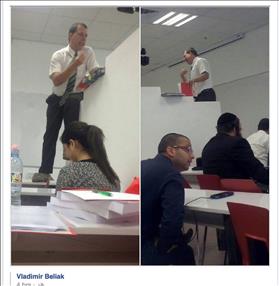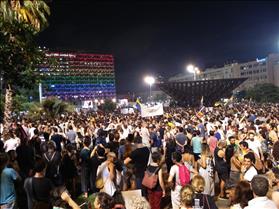Gender separation in academia & surrogacy for gay couples
Landmark Supreme Court Religion-State Rulings
This week, the Supreme Court handed down two landmark rulings on cases in the arena of religion and state, which have been pending for years. Once announced, they generated the expected outpouring of reactions.
Uri Regev 15/07/2021 12:55
Tags: gender separation · surrogacy · lgbtq · haredim

Kiryat Ono ultra-Orthodox college - posted on FB by MK Vladimir Beliak
Gender Separation in Academia
As pressure rose to integrate ultra-Orthodox young adults into academic studies and subsequently into the workforce, a debate ensued over whether that should justify offering gender separated academic studies or whether this is antithetical to the nature of academia and is undermining the core principle of gender equality. In 2016, four petitions representing opposing positions on the Council of Higher Education’s announcement of a five-year policy paper on the expansion of accessibility of higher learning for the ultra-Orthodox population were submitted to the Supreme Court. Both the debate and landmark Court ruling demonstrate that this is not a “black and white” issue. The conflict is between two legitimate considerations, requiring a balancing act.
The divergent opinions of the five Justices reflect this complexity. The expanded five-member panel was divided over the appropriate legal outcome, resulting in a decision that doesn’t accept in full any of the four petitions joined together by the Court. Given this, there is the expected battle over framing the ruling and identifying the winning side. All five Justices agreed that excluding female lecturers from teaching in male-only classes constitutes an infringement upon their dignity; they should be able to teach at all academic programs without discrimination.
However, the justices were divided on the issue of gender separated classes for the students, with all the justices in agreement that this constitutes an undermining of gender equality. The justices only differed on the proportionality of the acceptable limitation, given the opposing consideration in favor of allowing separation in undergraduate studies. While the ruling permits limited separation between male and female students as a necessary evil to achieve the desirable goal of integrating ultra-Orthodox students into academic studies, the justices set the following clear limitations on the scope of permitted separation:
Separation will:
- take place within classrooms, not outside them;
- only be available in undergraduate studies, not graduate programs;
- only be permitted for ultra-Orthodox students (not for Zionist Orthodox, some of whom have expressed preference for such separation);
- not allow for any discrimination against female lecturers;
- not allow for any discrimination in course offerings.
Hiddush will be holding two webinars to share with our readership an in-depth presentation of opposing positions regarding gender separation, which will provide an analysis of this ruling, its background and its ramifications. This will serve as a vehicle for deeper understanding of a social, religious, and moral dilemma, which illustrates the precarious consequences of state institutions being pulled into the religion-state arena.
One of the issues that Hiddush will be bringing to the fore is that, to the extent that gender separated education arises from strong religious views that assert gender separation as a necessary lifestyle, one should consider whether the graduates who were so intent on gender separation should be admitted into the civil service and other public positions that involve serving a gender mixed society.
Not surprisingly, some of the Justices referenced the legal situation in the USA. References included the fact that American law has dealt with the question of women-only educational programs and the existence of gender separated universities in America to this day. On the other hand, one Justice who was part of the minority opinion that separation should not be allowed in the manner implemented by the Council stressed the well-established principle that “separate but equal” is, as a rule, demeaning and discriminatory. She added that at the core of the Council’s policy was a stereotypical perception of women as “disturbing” men in their studies, which perpetuates gender class gaps and the perception of women as inferior.
One of the issues that Hiddush will be bringing to the fore is that, to the extent that gender separated education arises from strong religious views that assert gender separation as a necessary lifestyle, one should consider whether the graduates who were so intent on gender separation should be admitted into the civil service and other public positions that involve serving a gender mixed society. What is often demanded, especially by ultra-Orthodox politicians, is that full separation should be allowed throughout all of academia, but, at the same time, that graduates should be given affirmative action benefits when it comes to all facets of civil service.
More details can be found in the media’s coverage of the case, such as in the Times of Israel.

Demonstrators at the main demonstration in Rabin Square under the title, ''Demonstration of Equality for the Pride Community'', 2018, credit: Talmoryair
Surrogacy Within Israel for Gay Couples
The second ruling addressed the discriminatory law that has allowed heterosexual couples to seek legal surrogacy within Israel but forced gay couples and single men to travel abroad, incurring costs of hundreds of thousands of dollars to have children in this manner.
Litigation on this issue started in 2010. The petition was withdrawn when a public committee was appointed to regulate matters of procreation and birth, but it was resubmitted in 2015 when the committee failed to provide the necessary remedy. The Court enabled the government to resolve the matter through legislation; but as the political powers that be, pressured by the ultra-Orthodox, did not reach the desirable legislative solution, the Court has now seen fit to rule, for “it is not possible to tolerate the continued severe infringement of human rights, which is caused by the existing surrogacy law” – Chief Justice Hayut’s opinion.
Two important principles pronounced by the Court in the past were reiterated in this week’s ruling and are of note:
- Regarding the right to parenthood, the Court has held that it exists “at the foundation of all foundations; at the base of all bases. It is the essence of the human species. It is the aspiration of humankind.”
- The second highlights the severity of discrimination: “Discrimination, we know, is the evil of all evils… no wonder, therefore, that everywhere and in every generation, enlightened members of society labored and are still laboring to bring down and eliminate discrimination. The battle is an ongoing battle; a day-by-day battle.”
While the haredi leadership continues to claim that this ruling runs contrary to public sentiment and the traditional nature of the majority of Israeli Jews, the truth is exactly the opposite. Hiddush has been surveying public opinion on this question for years, and the most recent finding is that 74% of the adult Jewish population has expressed support for the principle that homosexual couples should enjoy equal rights to heterosexual couples, including the right to surrogacy. (May 13, 2021)
Also of note, when the Knesset voted down the amendment to extend legal surrogacy to homosexual couples, it was then-Prime Minister Netanyahu who publicly expressed not only his support for the amendment, but a commitment to pass it, despite Haredi opposition. That did not materialize, and it remains to be seen whether the Likud will remain committed to its promise of support or use it as another opportunity to thwart the coalition.
Formally speaking, the ruling provides that within six months of the ruling, all discriminatory conditions laid out in the current law for those with surrogacy rights will be canceled. The court said the six months were meant to allow authorities to prepare for the change in keeping with the principles laid out by the ruling.
Further information CLICK HERE.